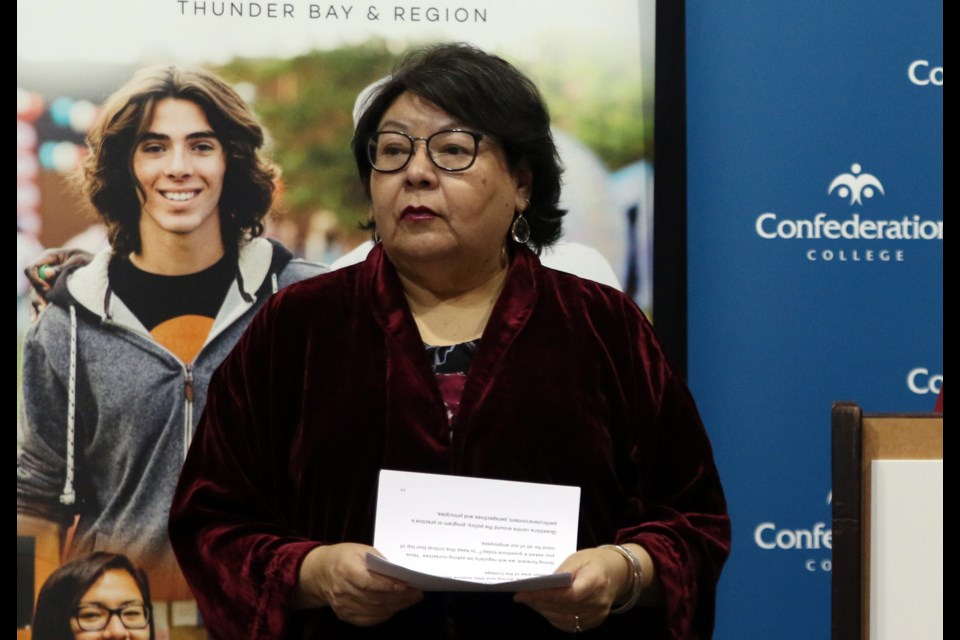THUNDER BAY - Confederation College is looking through a new lens in the hopes of becoming a more inclusive space that ensures Indigenous perspectives are reflected in its policies and programs.
“We have racism. We have racism in all our organizations,” said Confederation College president, Kathleen Lynch. “We aren't immune and we need to be able to address those incidents appropriately.”
The Diversity, Equity, and Indigenous Lens was officially launched on Wednesday and was developed as one of the recommendations from the systemic racism review at the college that began in 2018.
Lynch said they have already reviewed a number of policies and procedures and have identified ways to ensure the college is not knowingly or unknowingly being unequal in its treatment of Indigenous people or people of other races.
“We have done so much work on Indigenous education and we really focused on ensuring it is part of all of our programming, but we need to do the work internally with our employees too to ensure our employees understand the significance and that we are operating from an anti-racism perspective,” she said.
The Diversity, Equity, and Indigenous Lens works by asking four questions in three areas that include particulars and content, perspective, and principles. The questions relate to how something is culturally relevant to Indigenous communities, is it inclusive of Indigenous perspectives, or perpetuate systemic disparities faced by Indigenous Peoples.
According to the lens, if an answer to any of the questions is ‘no’ or ‘I don’t know’ then more work needs to be done.
“We essentially have created a template our staff can use to monitor their work in terms of any programming, policy development, or practice that they write so that it reflects the inclusion and the respectful treatment of Indigenous people, particularly students in our community here,” said S. Brenda Small, vice president with the Centre for Policy and Research in Indigenous Learning at Confederation College.
One of the areas that was identified as needing improvement was hiring practices and leaves of absences, Lynch said, adding the College will continue to work to make sure it is presenting a perspective that considers the experiences and culture of other races, particularly Indigenous people.
“We need our college to represent our community,” she said. “If 18 to 25 per cent of our community is indigenous, then our staff should reflect that as well.”
“The real work needs to start now in how we apply this lens and make sure we stick to it,” Lynch continued. “We have a multiyear plan to address the recommendations that this review identified in our organization and the diversity lens is just part of it.”
The lens will be an ongoing initiative that combines theory, principals, practice, as well as other cultural activities of Indigenous people.
“This is an ongoing process because our plan is that as we work with the tool, with the lens, we will be able to note where there may be some gaps in its application, where we may need to revisit it from time to time,” Small said. “We have to evaluate its effectiveness.”
Small added that she thinks this model will be helpful to other organizations, be it in education, the public sector, or private sector.
“We are going to implement the lens and start applying it in our work and evaluate, and we will be able to say to colleagues and people we work with not only locally, but provincially and nationally, that this is our experience with the model, whether they would like to adapt it to their organization,” she said.
The work is far from over though, Lynch said, and addressing systemic racism at the College or any other organization is not something that has an end.
“There is no finish line here,” she said. “This is ongoing work and what is great is that we keep learning. Thankfully the indigenous population has been very patient with us to while we learn and they have been supporting us.”
“We have been having some very powerful and encouraging conversations,” Small added. “Some of these conversations have been painful, but what it means is that there is a courage and also a humility and a generosity about having a conversation and we think that’s really exciting for a learning institution to do.”
